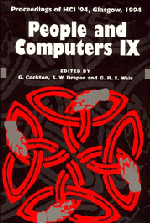Book contents
- Frontmatter
- Contents
- Preface: HCI'94 – You Probably Haven't Seen It All Before
- Part I Invited Papers
- Part II Methodology of Interactive Systems Development
- Crafting Interaction: Styles, Metaphors, Modalities and Agents
- Modelling Humans, Computers and their Interaction
- Notations and Tools for Design
- 22 XUAN: Enhancing UAN to Capture Temporal Relationships among Actions
- 23 Structured Notations to Support Human Factors Specification of Interactive Systems
- 24 Discount Dialogue Modelling with Action Simulator
- 25 Executable Task Analysis: Integration Issues
- 26 Beyond Data Models for Automated User Interface Generation
- Part VI Computer-Supported Cooperative Work
- Author Index
- Keyword Index
25 - Executable Task Analysis: Integration Issues
Published online by Cambridge University Press: 04 August 2010
- Frontmatter
- Contents
- Preface: HCI'94 – You Probably Haven't Seen It All Before
- Part I Invited Papers
- Part II Methodology of Interactive Systems Development
- Crafting Interaction: Styles, Metaphors, Modalities and Agents
- Modelling Humans, Computers and their Interaction
- Notations and Tools for Design
- 22 XUAN: Enhancing UAN to Capture Temporal Relationships among Actions
- 23 Structured Notations to Support Human Factors Specification of Interactive Systems
- 24 Discount Dialogue Modelling with Action Simulator
- 25 Executable Task Analysis: Integration Issues
- 26 Beyond Data Models for Automated User Interface Generation
- Part VI Computer-Supported Cooperative Work
- Author Index
- Keyword Index
Summary
Executable task models are considered to hold promise for increasing the impact of task analysis upon software engineering. However, this approach generates a number of integration issues when user interface management systems (UIMS) are employed at run-time. A number of models of integration are proposed and critiqued, employing a task scenario which involves the customisation of a geographic information system. Some current UIMS are shown to militate against this integration on account of the dominance which is accorded to the application. Some current task representations are shown to pose integration problems on account of both their procedural nature, and neglect of the application. One organising theme of the paper is that of executable task models being considered as particular cases of knowledge-based systems.
Keywords: task analysis, user interface management systems, knowledge-based systems, geographic information systems, rapid prototyping, knowledge representation, formal methods, user modelling.
Introduction
A truism of software engineering for interactive systems is that development should ideally proceed from a requirements analysis, and should incorporate user requirements. Task analysis (TA) is frequently regarded as the most formal of available methods for addressing user requirements. However, it is also generally acknowledged that the lack of integration between TA and software engineering techniques has reduced the design impact of TA.
Recently, one promising development is executable task models, which take some task specification and generate a series of interaction screens (de Haan & van der Veer, 1992; Wilson et al., 1993). This approach has the advantage of demonstrating user requirements to the software developer in a concrete and unambiguous fashion. It may be distinguished from conventional rapid prototyping by the fact that the interaction is generated in a more principled fashion.
- Type
- Chapter
- Information
- People and Computers , pp. 339 - 352Publisher: Cambridge University PressPrint publication year: 1994
- 2
- Cited by



